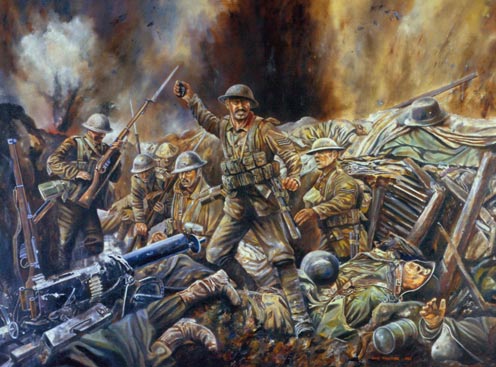
"Lance-Sergeant Fred McNess VC, 1st Battalion Scots Guards in action near Ginchy"
Ref: DR024
by David Rowlands
Giclee Print
Image Size: 58 x 38cm
During the Battle of the Somme, 1st Battalion Scots Guards moved to the front line on 10th September 1916. At 0600 hours on 15th September an artillery barrage began on the German line 1000 yards North of Ginchy, and the 1st and 2nd Guards Brigades stepped out of their trenches and advanced behind the creeping barrage. The weather was cold and wet. All round Ginchy was a network of shell holes due to recent bombardments, and every landmark had been obliterated. The shell holes had been connected up in two lines and occupied by German infantry, who had to be overcome before the main trench of the objective could be attacked.
Lance-Sergeant Fred McNess, during a severe engagement, led his men on with the greatest dash in the face of heavy shelling and machine-gun fire. On reaching the first line of enemy trenches, it was found that the left flank was exposed, and the Germans were coming along the trench throwing grenades. McNess organised a counter-attack, which he led in person, though he had already been hit three times by shrapnel that morning. He established a 'block', and continued encouraging his men and throwing bombs. For an hour and a half the terrific contest raged, the brunt of which was borne by L-Sgt McNess and a corporal. Gradually the Germans were being driven back, but the Guardsmen were running short of bombs. In the nick of time they found a supply of German bombs, quickly found out how to use them and began throwing them at the enemy. He was very severely wounded in the neck and jaw by the explosion of a German bomb, which caused his head to lie helplessly on his arm.
Weak with loss of blood, and almost blinded by it, he set off to find a doctor. "I had not gone far when I met the remnants of a carrying party. I wrote on a piece of paper asking for a dressing station, and they asked for the direction the boys had advanced. They were carrying bombs and the boys wanted them, so, staggering away, I took them up through the barrage. Five parties I led back, but the last one never got there, for a shell came over, killed three of them, and broke my jaw in another two places, so, almost blinded with blood and falling at every three or four steps, I left the field."
He was awarded the Victoria Cross on 26th October 1916.
